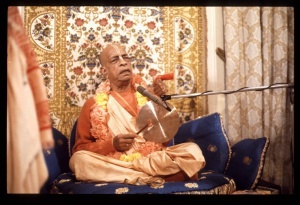CC Madhya 24.286: Difference between revisions
m (1 revision(s)) |
No edit summary |
||
| Line 1: | Line 1: | ||
{{ | [[Category:Sri Caitanya-caritamrta - Madhya-lila Chapter 24|C286]] | ||
<div style="float:left">'''[[Sri Caitanya-caritamrta|Śrī Caitanya-caritāmṛta]] - [[CC Madhya|Madhya-līlā]] - [[CC Madhya 24|Chapter 24: The Sixty-One Explanations of the Atmārāma Verse]]'''</div> | |||
<div style="float:right">[[File:Go-previous.png|link=CC Madhya 24.285|Madhya-līlā 24.285]] '''[[CC Madhya 24.285|Madhya-līlā 24.285]] - [[CC Madhya 24.287|Madhya-līlā 24.287]]''' [[File:Go-next.png|link=CC Madhya 24.287|Madhya-līlā 24.287]]</div> | |||
{{CompareVersions|CC|Madhya 24.286|CC 1975|CC 1996}} | |||
{{RandomImage}} | |||
==== TEXT 286 ==== | ==== TEXT 286 ==== | ||
<div | <div class="verse"> | ||
tāṅte rame yei, sei | :tāṅte rame yei, sei saba—'ātmārāma' | ||
:'vidhi-bhakta', 'rāga-bhakta',—dui-vidha nāma | |||
</div> | </div> | ||
| Line 12: | Line 16: | ||
==== SYNONYMS ==== | ==== SYNONYMS ==== | ||
<div | <div class="synonyms"> | ||
''tāṅte''—in all those Supreme Personalities of Godhead; ''rame''—takes pleasure in devotional service; ''yei''—those persons who; ''sei saba''—all of them; ''ātmārāma''—are also known as ''ātmārāma''; ''vidhi-bhakta''—devotees following the regulative principles; ''rāga-bhakta''—devotees following spontaneous love; ''dui-vidha nāma''—two different varieties. | |||
</div> | </div> | ||
| Line 19: | Line 23: | ||
==== TRANSLATION ==== | ==== TRANSLATION ==== | ||
<div | <div class="translation"> | ||
"One who always engages in the service of the Supreme Personality of Godhead is called ātmārāma. There are two types of ātmārāmas. One is an ātmārāma engaged in regulative devotional service, and the other is an ātmārāma engaged in spontaneous devotional service. | |||
</div> | </div> | ||
__NOTOC__ | |||
<div style="float:right; clear:both;">[[File:Go-previous.png|link=CC Madhya 24.285|Madhya-līlā 24.285]] '''[[CC Madhya 24.285|Madhya-līlā 24.285]] - [[CC Madhya 24.287|Madhya-līlā 24.287]]''' [[File:Go-next.png|link=CC Madhya 24.287|Madhya-līlā 24.287]]</div> | |||
__NOTOC__ | |||
__NOEDITSECTION__ | |||
Revision as of 08:53, 15 September 2021
Śrī Caitanya-caritāmṛta - Madhya-līlā - Chapter 24: The Sixty-One Explanations of the Atmārāma Verse

His Divine Grace
A.C. Bhaktivedanta Swami Prabhupada
A.C. Bhaktivedanta Swami Prabhupada
TEXT 286
- tāṅte rame yei, sei saba—'ātmārāma'
- 'vidhi-bhakta', 'rāga-bhakta',—dui-vidha nāma
SYNONYMS
tāṅte—in all those Supreme Personalities of Godhead; rame—takes pleasure in devotional service; yei—those persons who; sei saba—all of them; ātmārāma—are also known as ātmārāma; vidhi-bhakta—devotees following the regulative principles; rāga-bhakta—devotees following spontaneous love; dui-vidha nāma—two different varieties.
TRANSLATION
"One who always engages in the service of the Supreme Personality of Godhead is called ātmārāma. There are two types of ātmārāmas. One is an ātmārāma engaged in regulative devotional service, and the other is an ātmārāma engaged in spontaneous devotional service.